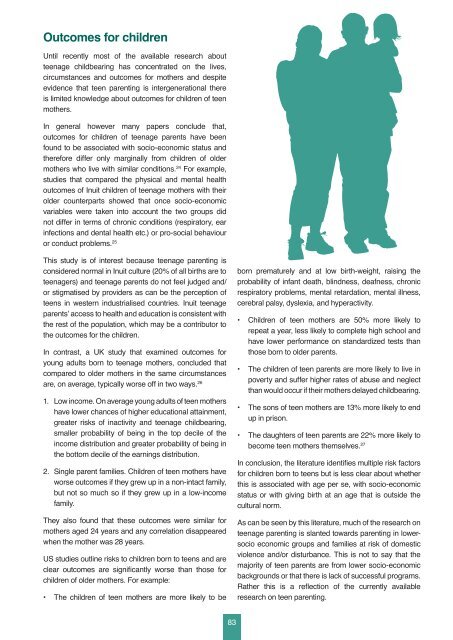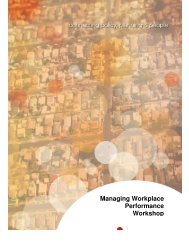Teenage Pregnancy Research Report - 3p Consulting
Teenage Pregnancy Research Report - 3p Consulting
Teenage Pregnancy Research Report - 3p Consulting
Create successful ePaper yourself
Turn your PDF publications into a flip-book with our unique Google optimized e-Paper software.
Outcomes for childrenUntil recently most of the available research aboutteenage childbearing has concentrated on the lives,circumstances and outcomes for mothers and despiteevidence that teen parenting is intergenerational thereis limited knowledge about outcomes for children of teenmothers.In general however many papers conclude that,outcomes for children of teenage parents have beenfound to be associated with socio-economic status andtherefore differ only marginally from children of oldermothers who live with similar conditions. 24 For example,studies that compared the physical and mental healthoutcomes of Inuit children of teenage mothers with theirolder counterparts showed that once socio-economicvariables were taken into account the two groups didnot differ in terms of chronic conditions (respiratory, earinfections and dental health etc.) or pro-social behaviouror conduct problems. 25This study is of interest because teenage parenting isconsidered normal in Inuit culture (20% of all births are toteenagers) and teenage parents do not feel judged and/or stigmatised by providers as can be the perception ofteens in western industrialised countries. Inuit teenageparents’ access to health and education is consistent withthe rest of the population, which may be a contributor tothe outcomes for the children.In contrast, a UK study that examined outcomes foryoung adults born to teenage mothers, concluded thatcompared to older mothers in the same circumstancesare, on average, typically worse off in two ways. 261. Low income. On average young adults of teen mothershave lower chances of higher educational attainment,greater risks of inactivity and teenage childbearing,smaller probability of being in the top decile of theincome distribution and greater probability of being inthe bottom decile of the earnings distribution.2. Single parent families. Children of teen mothers haveworse outcomes if they grew up in a non-intact family,but not so much so if they grew up in a low-incomefamily.They also found that these outcomes were similar formothers aged 24 years and any correlation disappearedwhen the mother was 28 years.US studies outline risks to children born to teens and areclear outcomes are significantly worse than those forchildren of older mothers. For example:• The children of teen mothers are more likely to beborn prematurely and at low birth-weight, raising theprobability of infant death, blindness, deafness, chronicrespiratory problems, mental retardation, mental illness,cerebral palsy, dyslexia, and hyperactivity.• Children of teen mothers are 50% more likely torepeat a year, less likely to complete high school andhave lower performance on standardized tests thanthose born to older parents.• The children of teen parents are more likely to live inpoverty and suffer higher rates of abuse and neglectthan would occur if their mothers delayed childbearing.• The sons of teen mothers are 13% more likely to endup in prison.• The daughters of teen parents are 22% more likely tobecome teen mothers themselves. 27In conclusion, the literature identifies multiple risk factorsfor children born to teens but is less clear about whetherthis is associated with age per se, with socio-economicstatus or with giving birth at an age that is outside thecultural norm.As can be seen by this literature, much of the research onteenage parenting is slanted towards parenting in lowersocioeconomic groups and families at risk of domesticviolence and/or disturbance. This is not to say that themajority of teen parents are from lower socio-economicbackgrounds or that there is lack of successful programs.Rather this is a reflection of the currently availableresearch on teen parenting.83



